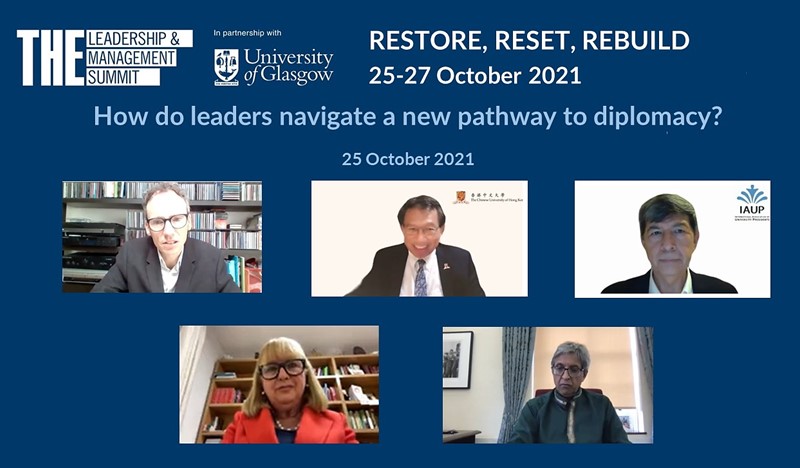
The Vice-Chancellor on challenges to diplomacy of university leadership

Prof. Rocky S. Tuan (middle, upper) sees distractions and the emergence of a ‘post-truth world’ as the biggest challenges to diplomacy of university leadership.
It has been a turbulent year for higher education. Universities have had to face complex shared challenges from the pandemic, geopolitical tensions, and social conflicts in their community. This calls for diplomacy of university leadership to engage in constructive dialogues and to collaborate on solutions to the world’s most pertinent issues.
At the panel titled ‘How Do Leaders Navigate a New Pathway to Diplomacy?’ at the Times Higher Education Leadership and Management Summit on 25 October, Prof. Rocky S. Tuan, Vice-Chancellor of CUHK, joined a group of distinguished speakers who shared their experience and insight into how they have navigated challenges to uphold and advance the core mission and value of universities.
Prof. Tuan sees distractions and the emergence of a ‘post-truth world’ as the biggest challenges to diplomacy of university leadership. He reminded university leaders not to lose sight of universities’ core responsibilities in creating, disseminating and applying knowledge as well as in nurturing the world’s next generation.
The ‘post-truth world’ is exacerbated with the proliferation of social media where there is inadequate and ineffective oversight of online behaviours and ethics. ‘Universities are the guardians of knowledge. If we see things that are not true, we must say as such on the basis of evidence. We are in the knowledge business and we have a moral responsibility to be involved in this process,’ said Prof. Tuan. He added that misinformation and dysinformation amplified via social media can be characterised as an ‘infodemic’ that has led to the increased polarisation and divisiveness seen in many societies.
The Vice-Chancellor believes that the world remains a global village and universities must be underpinned by a strong sense of community spirit and should work towards enabling the adoption of knowledge by government policymakers. ‘Our job is to make a better world through education and we must play our part to inform policymakers,’ he said.
Other panel members included Prof. Adam Habib, Director of The School of Oriental and African Studies of the University of London in the UK; Prof. Mary McAleese, Professor of Children, Law and Religion of the University of Glasgow in the UK and former President of the Republic of Ireland; and Dr. Fernando León-García, President of the CETYS University System in Mexico.